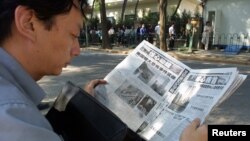A survey of American business leaders finds many of them believe the non-immigrant H-1B visa program should be reformed.
These visas let American companies employ for up to six years people from other countries who have special skills that American workers do not.
Matthew Slaughter leads the Tuck School of Business at Dartmouth College. He directed the survey, which asked 400 executives their opinions about the program.
The survey showed that companies that need to hire people with special skills from other countries believe the process is too costly.
Slaughter said 82 percent of those asked “said hiring a foreign worker costs as much as or more than hiring a comparably-skilled U.S. worker.”
Some Americans believe H-1B visa holders are trying to take their jobs. But Rosario Marin, the former Treasurer of the United States, disagrees. She is now the co-chair of the American Competitiveness Alliance. She said the high technology industry needs foreign workers because it cannot find Americans with the same level of skill.
“Almost 80 percent (of) full-time graduate students in electrical engineering in the United States are international students,” she said. “In computer science, foreign nationals make up more than 70 percent of graduate students.”
Application process
Workers cannot apply for an H-1B visa. The company that wants to employ them must do so.
There were about 233,000 applications in the last year. But the law permits only 65,000 visas to be granted, plus 20,000 visas for those who hold masters degrees.
When the number of applications is greater than the number of visas the law permits, a lottery system is put into effect.
The New York Times newspaper reports that in 2014, about half of the applications were rejected because the yearly visa limit had been reached. In 2015, that number increased to two-thirds of applications.
People who apply for the visa but do not receive one are not permitted to work in the United States. Marin said that could help companies outside the U.S.
“Our economic rivals are recruiting them,” she said. She notes that businesses in other countries try to employ some of the workers whose applications have been rejected.
Bjorn Billhardt is a business owner. He employs H-1B visa holders. He said not being able to employ people with special skills could hurt American businesses.
“In (the) early stage of a company, it’s that critical employee that will make or break the company,” he said.
Matthew Slaughter said about three quarters of the companies that need foreign workers say that if they have high-skilled positions that are not filled within a month, the company can be harmed.
He said 71 percent of those asked said they would consider moving some of their operations to other countries if they find it too difficult to hire skilled workers in the United States.
Calls for reform
In November, The New York Times noted that the goal of the program was to help businesses in the United States expand. This would help the economy, and create more jobs in the U.S.
But the newspaper reported, “in recent years, many H-1B visas have gone to temporary immigrants who lacked special skills and displaced American workers from jobs.”
Republican Senators Chuck Grassley and Jeff Sessions believe the program is being abused by employers.
Republican presidential candidate Donald Trump called for increasing the pay of H-1B visa holders. His campaign website says that would force companies to give jobs to unemployed Americans or immigrants in the United States rather than to workers from other countries.
Senator Ted Cruz says on his website the government should stop H-1B visas for six months to permit an “investigation and audit of pervasive allegations of abuse of the program.”
Cruz says “in recent months, more and more reports have become public of companies replacing American workers with cheaper foreign workers, contrary to the stated intent of the H-1B visa program.”
In the past year, a committee of the U.S. Senate has held two official meetings to learn about the effect of the H-1B program on American workers.
The New York Times reports a small number of large companies apply for the H-1B visas. This increases their chances of success, because of the lottery system. The newspaper reports that federal records show these companies have learned how to control the system.
Slaughter and Marin say Congress should reform the H-1B visa program’s rules to help American businesses.
I’m Christopher Jones-Cruise.
VOA's Andrianna Zhang reported this story from Washington. Christopher Jones-Cruise adapted it for Learning English. Mario Ritter was the editor.
We want to hear from you. Write to us in the Comments Section, or visit our Facebook page.
_____________________________________________________________
Words in This Story
lottery – n. a system used to decide who will get or be given something by choosing names or numbers by chance; a process in which a selection is made by chance, not on merit
rival – n. a person or thing that tries to defeat or be more successful than another
stage – n. a particular point or period in the growth or development of something
critical – adj. extremely important
make or break – adj. resulting in either definite success or definite failure (always used before a noun)
pervasive – adj. existing in every part of something; spreading to all parts of something
intent – n. the thing that you plan to do or achieve; an aim or purpose





